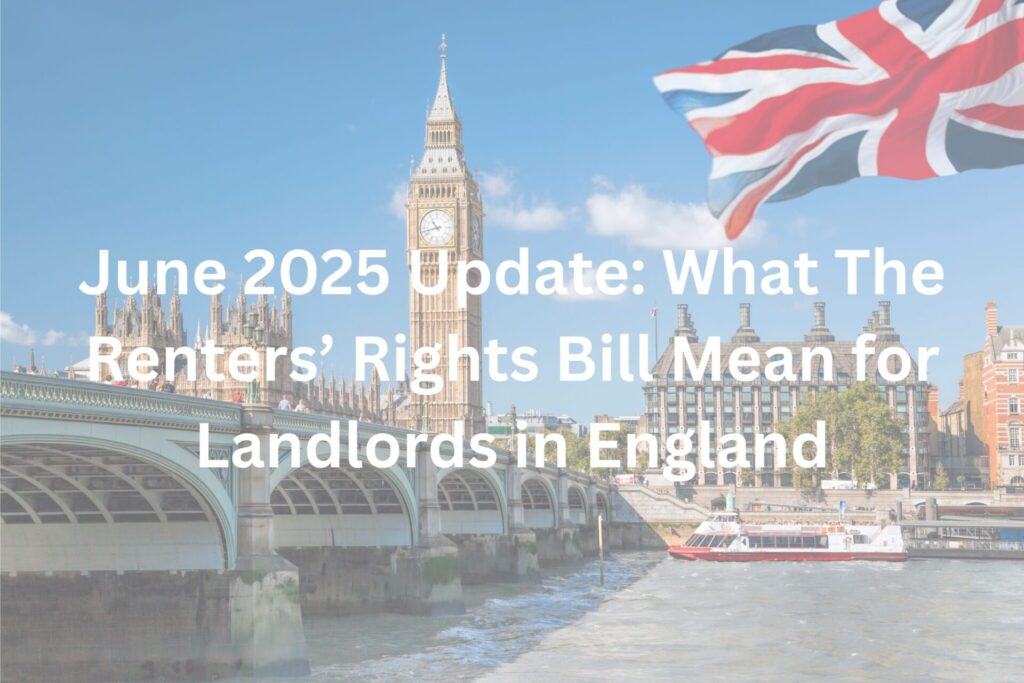By Amalia Protheroe, Owner of Homelink Lettings
Serving Chepstow, Newport, Bristol & Surrounding Areas
Hello, I’m Amalia Protheroe, and I run Homelink Lettings.
You might be wondering why we’re paying such close attention to the Renters’ Rights Bill in England. The reason is simple. Many of our landlords own rental properties on both sides of the border, in both England and Wales. So when legislation like this comes along, it directly affects a large part of our client base. Following the latest government update on 14th June 2025, we now have much more clarity on what’s included in the Bill, what’s been removed, and when the changes are likely to take effect.
When Will the Renters’ Rights Bill Become Law?
As of June 2025, the Renters’ Rights Bill is progressing quickly through Parliament. The Third Reading is scheduled for 1st July, with Royal Assent expected shortly after — likely before 22nd July, just ahead of the summer recess. This means landlords in England could start seeing changes roll out before the end of 2025, with a phased implementation continuing into 2026.
Section 21 “No-Fault” Evictions to Be Abolished
One of the most significant changes in the Renters’ Rights Bill 2025 is the end of Section 21 evictions. These “no-fault” evictions will be banned, meaning landlords will no longer be able to end tenancies without giving a valid reason. Instead, they’ll need to rely on updated Section 8 grounds, which include serious rent arrears, anti-social behaviour, selling the property, or moving back in.
There will be around eight legal grounds under which a landlord can serve notice, so while “just because” won’t be enough anymore, there are still clear legal routes to regain possession when necessary.
Periodic Tenancies Will Replace Fixed-Term Contracts
All new tenancies in England will become periodic tenancies by default — rolling month-to-month agreements with no fixed end date. Over time, existing fixed-term tenancies will convert as their agreements expire. This marks a big shift from the standard six- or twelve-month contracts and could result in more frequent tenant turnover.
We understand this could make long-term planning more complex, particularly when coordinating property refurbishments or financing. At Homelink Lettings, we’re fully prepared to guide our landlords through this change, helping to minimise disruption and maintain rental stability.
One Rent Increase Per Year — With Notice
Under the Bill, landlords will only be able to increase rent once per year, and must give at least two months’ written notice. Tenants will also have the right to challenge increases through a tribunal if they believe the new rent is unreasonable or above market value.
For our landlords with Welsh properties, this setup will feel very familiar. The Renting Homes (Wales) Act already follows similar rules, and we’ve been applying these principles for years. Our software automatically tracks rent review dates, giving you and your tenants plenty of time to prepare. Clear, data-backed communication helps ensure a smooth and conflict-free process.
Ban on Rental Bidding and Overbidding
The Renters’ Rights Bill will also ban rent bidding — preventing landlords from accepting offers above the advertised rental price. While this practice has been common in highly competitive markets like London, it’s something we rarely encounter in South Wales or Bristol. Nevertheless, it’s a welcome move toward greater fairness and transparency in lettings.
The Decent Homes Standard for Private Rentals
The Bill extends the Decent Homes Standard, already applied to social housing, to all private rental properties. This means every rental home must meet a clear legal benchmark for safety, cleanliness, and condition.
At Homelink Lettings, we already insist on these standards. We work proactively with landlords to make sure their properties are fully compliant, comfortable, and ready to let. For landlords who haven’t prioritised maintenance, this is a push in the right direction — and tenants stand to benefit from healthier homes.
Awaab’s Law and Faster Repairs
Also included in the Renters’ Rights Bill is Awaab’s Law, which mandates timely repairs for serious health hazards like damp and mould. This law was introduced following a high-profile case in social housing and ensures that landlords respond swiftly to protect tenant health.
We’ll cover the specifics of this law in a future article, but the bottom line is clear: ignoring critical repairs will no longer be tolerated under the new legislation.
New Landlord Database and PRS Ombudsman
The government is introducing a new Private Rented Sector Ombudsman to handle disputes outside the court system. Alongside this, a national landlord database will be created, likely recording enforcement action and past convictions.
Although it’s not yet confirmed how much of this database will be publicly accessible, the goal is accountability. It’s an opportunity for responsible landlords to stand out and build trust. Personally, I’d also welcome the introduction of a tenant database — because fairness should go both ways.
Tenants’ Right to Request Pets
The Bill will give tenants the legal right to request permission to keep a pet. Landlords will only be able to refuse with a valid reason and may require pet insurance or specific tenancy clauses to cover potential damage.
We’ve found that tenants with pets often stay longer and treat the property with care. We encourage landlords to consider each request on a case-by-case basis, and we’re here to help you make the right decision.
No More Blanket Bans in Property Listings
The Renters’ Rights Bill also bans discriminatory adverts. Landlords will no longer be allowed to advertise exclusions like “no DSS,” “no children,” or “no pets.”
This doesn’t mean you must accept every applicant — it simply means listings must be inclusive and fair. You’re still entitled to assess suitability based on affordability, references, and the condition of the property. We’ve already updated our marketing practices to reflect this, and we’re here to support any landlord making the same changes.
Final Thoughts on the Renters’ Rights Bill
The Renters’ Rights Bill 2025 marks the biggest shift in private renting legislation in decades. It introduces better standards, more rights for tenants, and tighter rules for landlords — but it also brings new challenges and responsibilities.
At Homelink Lettings, we’re ready. Many of these changes reflect best practices we already follow in Wales. Our systems are built to help you adapt quickly, stay compliant, and keep your property investments running smoothly.
If you’d like help reviewing tenancy agreements, preparing for rolling tenancies, or understanding how these updates affect your rental income, just reach out.





